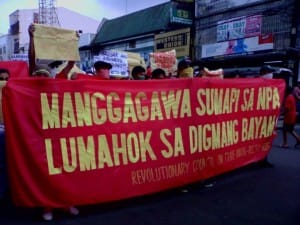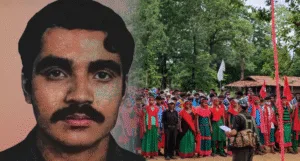
By Jose Maria Sison & Julieta de Lima
All of us whose lives have been touched by Fr. Edgar Koning are grieved to learn of his passing. But at the same time, we celebrate his glorious and exemplary life in the service of the people.
We honor him as we celebrate his devotion and deeds in serving the cause of the oppressed and exploited. He was a Christian par excellence and an outstanding advocate of social justice, an indefatigable worker for the common good.
In fact, we first came to know him as a steadfast fighter for the rights and welfare of the sugar workers and other working people in Escalante, Negros Occidental. He stood with them in their bitter struggles against the landlord class and the Marcos fascist dictatorship.
Night and day, he became the target of slander and calumny from the oppressors and exploiters, even as by his deeds he won the admiration and support of the workers, peasants and the intelligentsia.
We of course had also heard of his deeds from Louie Jalandoni and Coni Ledesma even while he was still in Negros and since then he had always occupied a warm spot in our hearts.
Julie had the good fortune of meeting Edgar when she slipped out of the Philippines and traveled to The Netherlands in 1984. By then Edgar had already returned to his home country. He guided her to Dutch personages and a wide range of solidarity activists concerned with the human rights situation in the Philippines.
Julie and I enjoyed and benefited from Edgar’s high sense of service and warm concern for others and his personal sense humor. We were moved by his steadfast desire for the national and social liberation of the Filipino people.
When the Corazon Aquino regime turned repressive and Aquino began her own massacres of peasants in 1987, Edgar again turned proactive in solidarity campaigns for the peasants and workers in the Philippines. In a sense he never left the Philippines.
He paid close attention to developments in the Philippines and among the Filipino people no matter what his duties were in the Carmelite order. He was an active leading figure in the Filipijnengroep Nederland (FGN) and founded the Philippine Information and Documentation Center (FIDOC).
To be able to work on my book on the Philippine revolutionary movement within the first year of our stay in the Netherlands, Edgar gave Rainer Werning and us free board, lodging and other facilities in preparing the outline and the initial typescript of The Philippine Revolution: The Leader’s View. We enjoyed the comfort of home as well as using Edgar’s rich collection of Philippine books and other documentary materials.
In Edgar’s community Antonio Zumel, Ruth and their young daughter Malaya found a home when they also sought political asylum in the Netherlands. As Edgar served Filipinos in need, Julie and I had close connection with him and of course there were many solidarity meetings when we communed with him.

We always had his warm solidarity and support. In the campaign for my political asylum and residence, Edgar translated my poems and helped publish them in 1993 in a volume titled Jose Maria Sison GEDICHTEN. This was well received by solidarity activists and literary friends in poetry festivals.
There are many occasions, close connections and cooperation with Edgar that Julie and I can mention. But we must let others give their own testimonies to allow all of us the opportunity to give the best possible depiction of Edgar as a well-rounded and excellent servant of his faith and the people.
The spirit and memory of Edgar Koning will live forever. It is embedded and will continue to live in the Carmelite order, in the hearts and minds of the many people with whom he cooperated and in the movement of the Filipino people for national and social liberation. ###




